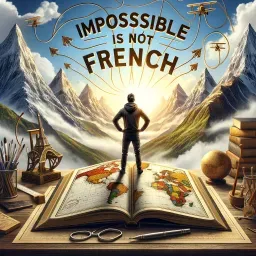You must be bold, daring

0
0
0
0
- Meaning
- The phrase highlights the importance of being bold and daring in one's pursuits, suggesting that embracing risk and the unknown is crucial for achieving goals and making a significant impact. Philosophically, it echoes existentialist ideas of creating one's own path and accepting the freedom and responsibility that comes with choice. Psychologically, it speaks to the concept of self-efficacy, where belief in one's capabilities influences the likelihood of taking risks.
- Allegory
- The image conveys the essence of the phrase by illustrating the act of courage and embracing the unknown. The individual standing on the cliff's edge represents boldness, with the sunrise symbolizing new opportunities and a hopeful outlook. The blooming flowers and trees indicate growth and the beauty that comes from taking daring actions, reinforcing the theme of resilience and optimism in the face of challenges.
- Applicability
- Practically, the phrase encourages individuals to step outside of their comfort zones in both personal and professional contexts. Whether it's pursuing a dream job, engaging in difficult conversations, or challenging societal norms, being bold often results in growth and new opportunities.
- Impact
- This phrase has influenced personal development and leadership discourses, often cited in motivational speeches, seminars, and literature. It serves as a rallying call for individuals seeking inspiration to overcome fears and limitations, thereby fostering a culture that values initiative and bravery.
- Historical Context
- The exact historical context of this phrase is unclear, as it reflects a widely shared ethos across various cultures and eras, particularly in modern motivational contexts that rose to prominence in the late 20th century. The surge of self-help literature in the 1970s and 1980s popularized themes of boldness and courage.
- Criticisms
- Criticism of this phrase typically revolves around the idea that not all risks are worth taking or that blind boldness can lead to unfortunate consequences. Critics might argue that a more cautious approach or careful consideration is often essential to navigate complex situations successfully.
- Variations
- Variations of this phrase can be found in different cultures, reflecting the universal value of courage. For example, in Chinese, a similar sentiment can be expressed as "Those who dare, win." Culturally, the interpretation may vary with emphasis on communal support versus individual bravery, showing a rich tapestry of ideas around boldness.
-

Impossible is not French.
-

The seaweed is always greener in somebody else’s lake.
-

You gotta put your behind in your past.
-

Sometimes the right path is not the easiest one.
-

Never interrupt your enemy when he is making a mistake.
-

I’m not crazy, my reality is just different than yours.
-

A dream is a wish your heart makes.
-

Our fate lives within us; you only have to be brave enough to see it.
-

When you’re the best of friends, having so much fun together.
-

Fish are friends, not food.
-

The journey begins, and the voyage is already complete.
-

Always let your conscience be your guide.
No Comments